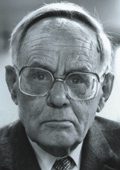Karl Rahner

Karl Rahner, SJ (March 5, 1904 — March 30, 1984) was a German Jesuit and theologian who, alongside Bernard Lonergan and Hans Urs von Balthasar, is considered one of the most influential Roman Catholic theologians of the 20th century.
| Society of Jesus | |
|
History of the Jesuits |
|
He was born in Freiburg, Germany, and died in Innsbruck, Austria.
Before the Second Vatican Council, Rahner had worked alongside Yves Congar, Henri de Lubac and Marie-Dominique Chenu, theologians associated with an emerging school of thought called the Nouvelle Théologie, elements of which had been criticized in the encyclical Humani Generis of Pope Pius XII.
Contents |
Work
His theology influenced the Second Vatican Council and was ground-breaking for the development of what is generally seen as the modern understanding of Catholicism.
Foundations of Christian Faith
Written near the end of his life, Rahner's Foundations of Christian Faith (Grundkurs des Glaubens) is the most developed and systematic of his works, most of which were published in the form of essays.
Economic and Immanent Trinity
Among the most important of his essays was The Trinity, in which he argues that "the economic Trinity is the immanent Trinity, and the immanent Trinity is the economic Trinity". That is to say, God communicates Himself to humanity ("economic" Trinity) as He really is in the divine Life ("immanent" Trinity).
Although Rahner was emphatic that the identity between "economic" Trinity and "immanent" Trinity does not lead to Modalism, because God could not communicate Himself to humanity as threefold (dreifaltige) unless He were threefold in reality, some (e.g., Jürgen Moltmann) have found his teaching to tend strongly in a Modalist direction.
God's self-communication
Rahner maintained that the fulfillment of human existence consists in receiving God's self-communication, and that the human being is actually constituted by this divine self-communication. This reception of God is only full or complete at the end of time in the beatific vision, but is present now in seed-form as grace.
Transfinalization
Rahner was a critic of substance theory and was concerned about the finality of liturgy. He proposed instead to re-name transubstantiation into transfinalization. However, this theory was rejected by Pope Paul VI in the encyclical Mysterium Fidei.
Awareness of God
The basis for Rahner's theology is that all human beings have a latent ("unthematic") awareness of God in any experiences of limitation in knowledge or freedom as finite subjects. Because such experience is the "condition of possibility" for knowledge and freedom as such, Rahner borrows the language of Kant to describe this experience as "categorical."
Such is the extent of Rahner's idea of the "natural knowledge of God" — what can be known by reason prior to the advent of "special" revelation. God is only approached asymptotically, in the mode of what Rahner calls "absolute mystery." While one may try to furnish proofs for God's existence, these explicit proofs ultimately refer to the inescapable orientation towards Mystery which constitute — by transcendental necessity — the very nature of the human being.
Incarnation-grace
For Rahner at the heart of Christian doctrine is the co-reality of Incarnation-grace. Incarnation and grace appear as technical terms to describe the central message of the Gospel: God has communicated Himself. The self-communication of God is crucial in Rahner's view: grace is not something other than God, not some celestial 'substance,' but God Himself. The event of Jesus Christ is, according to Rahner, the center-point of the self-communication of God. God, insists Rahner, does not only communicate Himself from without; rather, grace is the constitutive element both of the objective reality of revelation (the incarnate Word) and the subjective principle of our hearing (the Holy Spirit). Thus grace lies at both sides — without and within.
Mode of grace
Rahner's particular interpretation of the mode in which grace makes itself present is that grace is a permanent modification of human nature in a supernatural existential (a phrase borrowed from Heidegger). Grace is perceived in light of Christianity as a constitutive element of human existence. For this reason, Rahner denies the possibility of a state of pure nature (natura pura, human existence without being-involved with grace), which according to him is a counterfactual.
Anonymous Christianity
Anonymous Christianity is the theological concept that declares that people who have never heard the Christian Gospel might be saved through Christ.
Inspiration for this idea sometimes comes from the Second Vatican Council's Lumen Gentium, which teaches that those "who no fault of their own, do not know the Gospel of Christ or His Church, but who nevertheless seek God with a sincere heart, and moved by grace, try in their actions to do His will as they know it through the dictates of their conscience – those too may achieve eternal salvation" [1].
Rahner's development of the idea preceded the Council, and became more insistent after it received its dogmatic formulation. Non-Christians could have "in [their] basic orientation and fundamental decision," Rahner wrote, "accepted the salvific grace of God, through Christ, although [they] may never have heard of the Christian revelation." His writings on the subject were somewhat related to his views about the mode of grace.[2]
Language about God: Univocity and equivocation
Like others of his generation, Rahner was much concerned with refuting the propositional approach to theology typical of the Counter Reformation. The alternative he proposes is one where statements about God are always referring back to the original experience of God in mystery. In this sense, language regarding being is analogically predicated of the mystery, inasmuch as the mystery is always present but not in the same way as any determinate possible object of consciousness. Rahner would claim St. Thomas Aquinas as the most important influence on his thought, but also spoke highly of Heidegger as "my teacher," and in his elder years Heidegger used to visit Rahner regularly in Freiburg.
Some have noted that the analogy of being is greatly diminished in Rahner's thought. Instead, they claim, equivocal predication dominates much of Rahner's language about God. In this respect, similarity between him and other Thomist-inspired theologians is seen as problematic. Others, however, identify Rahner's primary influence not in Heidegger but in the Neo-Thomists of the early 20th century, especially the writings of Joseph Maréchal.
Selected bibliography
References
- ↑ Lumen Gentium, paragraph 15
- ↑ Clinton, Stephen. Peter, Paul, and the Anonymous Christian:A Response to The Mission Theology of Rahner and Vatican II October, 1998 The Orlando Institute, Leadership Forum November, 1998 Evangelical Theological Society
Further reading
- Egan, Harvey J.; Karl Rahner: Mystic of Everyday Life (Crossroad, 1998)
- Endean, Philip; Karl Rahner and Ignatian Spirituality (Oxford, 2001)
- Fischer, Mark F.; The Foundations of Karl Rahner: A Paraphrase of The Foundations of Christian Faith, with Introduction and Indices (Crossroad, 2005), ISBN 0824523423
- Kilby, Karen; A Brief Introduction to Karl Rahner (Crossroad, 2007)
External links
- Karl Rahner Society with biography and bibliography
- Karl Rahner Archive in Munich
- Bibliographical aids
- Boston Collaborative Encyclopedia of Western Theology: Karl Rahner
- Works by or about Karl Rahner in libraries (WorldCat catalog)
|
|||||||||||||||||||||||||||||||||||||||||
|
||||||||||||||||||||||||||||||||||||||||||


